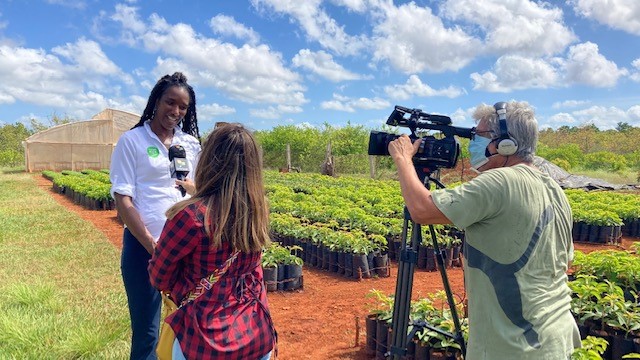 USA Rice's Asiha Grigsby (left) on camera while touring Cuban ag facilities in April 2022
USA Rice's Asiha Grigsby (left) on camera while touring Cuban ag facilities in April 2022
Jul 22, 2022
WASHINGTON, DC — Yesterday, USA Rice joined other industry members of the U.S. Agriculture Coalition for Cuba (USACC) to meet with Congressional staff regarding current and future legislation that would remove barriers to U.S. trade with Cuba.
Prior to the trade embargo, Cuba was a top market for U.S. rice exports and continues to be a significant rice importer from origins in Asia and South America.
On an April visit to Cuba, Asiha Grigsby, USA Rice director of international promotions for the Western Hemisphere, said, “The people of Cuba and the President of the Republic welcomed the USACC delegates with open arms and as collaborators in an effort to stimulate bi-lateral trade opportunities between our two countries.”
Currently, Cuba can legally buy U.S. rice if the importer pays cash up front and uses a third-country bank to provide the initial credit and serve as an intermediary. Legislation is needed to allow for U.S. banks to directly provide financing for Cuban buyers and help U.S. exporters better compete with the generous credit terms offered by other origins.
USACC met with six Congressional offices that provided hopeful feedback for the future of Cuba legislation in the next Congress. However, a number of political considerations continue to interfere with making significant progress toward a complete lifting of the embargo. Many legislators would prefer a bipartisan approach that includes protective measures for U.S. exporters and financial institutions.
While Cuba has managed to stay afloat economically during the 62-year embargo, the situation has become more urgent over the last two years as Cuba navigates a food crisis with high rates of inflation and limited access to hard currency and basic goods, compounded by restrictions caused by the COVID-19 pandemic. These issues only exacerbate the need for access to economical, high-quality food that could easily be supplied by the U.S. given the logistical advantages.
“The people of Cuba want to do business with us and want to buy U.S. rice, making the credit barriers and other regulatory hurdles all the more frustrating,” said Grigsby. “We hope that Congress will be able to work through their differences to advance the U.S.-Cuba relationship as soon as possible.”